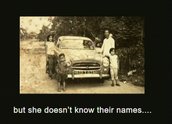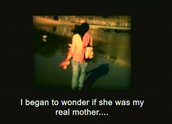

My Mother Told Me (2007)
Synopsis
A woman pieces together fragments of her own and her mother’s past, from stories her mother tells her. The stories are about her mother’s life in a Cambodian village before the onset of war, her own birth as a refugee in Thailand and their arrival in Australia. There are also some stories her mother won’t tell – like what became of her absent father. The woman tries to build a new identity for herself.
Curator’s notes
My Mother Told Me is part of a series of works by artist Geoffrey Weary that document personal stories in a combination of biography and fiction. It combines an atmospheric soundscape with animated text narration and manipulated video and still images. The visual material is largely archival. Weary developed the script with Leakhena Sy and used her family’s photographs of life in Cambodia as one of his sources. He also uses archival news footage.
The result is a curious melding of historical and biographical record with intense ambiguity and subjectivity. The narration seems autobiographical but is text-based rather than spoken, and the narrator never reveals her identity. She recounts her mother’s stories but casts doubt on her mother’s own reliability as a narrator. The archival images cue the idea of recorded history but are also manipulated, adding a layer of interpretation beyond their historical origins. The film’s status as documentary or fiction is ambiguous.
My Mother Told Me starts as the story of a woman living in a village and experiencing the onset of war. It evolves into a deeply personal contemplation by the woman’s daughter of her relationship with her mother, her own conflicted identity and her desire to construct a new self. In this sense, a fragmentary account of the horrors of war and the trauma of refugee experience evolves into an exploration of the aftershocks of such events through generations of families and the impact of cultural dislocation on identity.
Other short films about parent-child relationships in the context of refugee experience include Father (2008) and Delivery Day (2000).
- Overview
- Curator’s notes
- Video 2 clips
- Principal credits
- Find a copy
- Make a comment
- Map
- Add your review



